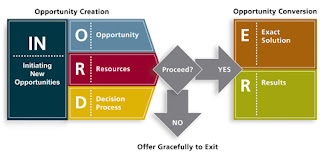Dr. Stephen R. Covey
with Elizabeth
during his famous LIVE “Big Rocks” Presentation.
Welcome back to week number two of our 3-week BusinessCommunication Series. In case you missed last week’s session, The Writing Advantage, you can follow this link to read it now.
Presentations
have been a common form of business communication for some time. We can give a presentation at an internal
meeting, on a sales call or even in the class room. Below are a few points for consideration.
Meetings - Keep in mind that people are
making crucial business decisions based on your information. Make sure that your point is clear and
welcomes input. If you can provide a
handout with key points and place for your notes, this will help them know what
to focus on during your time in the front of the room.
Sales Presentation - A good sales
presentation should be interactive with the client. If you have done a good job analyzing what
the client needs, when it’s time to recommend your solution, you can ask
questions that are checking their buy in along the way. Be prepared to adjust on the fly if needed. Continuing down the path as a talking head in
the front of the room and not addressing their concerns will kill your
opportunity.
Classroom Facilitation - This is usually reserve for experienced trainers, but even leaders can be put in this position from time to time. Knowing your content well and connecting with your audience is key!
Regardless of which situation you are in, following these few tips below can help increase your effectiveness.
1. Design - Taking time to design
your presentation is key. Remeber to "Begin with the End in Mind." You need to
identify the needs of your audience.
What points do you want to make?
What do you want them to do a result after seeing your presentation?
2. Check point - If your
presentation requires equipment, allow adequate time to connect everything and
check to make sure everything is working (sound, slides, projector, etc.)
3. Pictures - A picture is worth ….
(you know the rest). Using a powerful
image to make your point is far more effective than writing out the bullet
points of your speech
4. Keep Moving - There is power in
stillness … when making your point.
After you do so, keep the content flowing and feel free to move across
the room and engage with your entire audience.
5. Build Up - When you look at a
tall building, your eyes typically take you to the top. Your presentation should do that for your
audience. As you land key points, make
sure they are guiding them to the one key takeaway you want them to know.
6. Close - When it’s time to wrap
it up, review your points, restate your purpose and close strong!
These are
just a few helpful tips. If you want to
watch some great presentations, I highly recommend a website called www.ted.com.
You will see some amazing presentations and I’m sure you will laugh,
learn and become inspired!
If your team
needs better presentation skills, I highly recommend our 2-day PresentationAdvantage Program. This is limited to 12
participants in the classroom.
Participants will bring actual presentations that they are currently
working on. They will draft their
presentation and practice segments of it over the 2-day period. More importantly, our consultants record
their sessions for them so they can see their body language, eye movement,
connection with audience, etc. By the
end of the 2-days participants have the mind-set, skill-set and tool-set to
create effective presentations every time!
I attended
this content a few years ago and I know that it made a significant impact on my
capability to deliver a quality presentation.
For more information, please request a meeting using our meeting
invitation tool on the right side of this page or simply call me at
214-387-9960.
Enabling
greatness, one organization at a time,
John Vakidis







